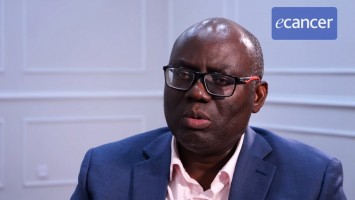This session is really going to talk about how we are using telemedicine and video conferencing now globally to improve access to cancer care. Because we know that there are a lot of disparities, inequalities in cancer care and one of the innovative ways of addressing it is the use of telemedicine to address these issues globally.
How can telemedicine, telementoring networks, and AI enhance cancer care delivery in the face of healthcare disparities and global crises?
In low- and middle-income countries there are a lot of inadequate resources, a lot of inequalities and inequities in cancer care. In some countries they don’t have adequate trained healthcare professionals for cancer care. One of the easiest, innovative ways of training people to undertake cancer care, starting from prevention, early detection, effective treatment and survivorship programmes and palliative care, is the use of telemedicine to train people. Because with the use of telemedicine video conferences it’s easier to train people instead of them travelling to areas. They can stay wherever they are and get training through telemedicine and teleconferencing. With this we can increase the number of healthcare people that can provide adequate cancer care.
Also those who are already trained we can do continuous mentoring and transfer of skills to improve their knowledge and skills to provide efficient and adequate cancer care.
Do you have any real world examples of how this is being used so far?
In the Northern Cape province of South Africa where I work there was indiscriminate mining of asbestos without proper protection of the environment and also of the people and their families. Because of that there is a high incidence of mesothelioma and lung cancer. Unfortunately, the majority of the people were diagnosed at very late stages because of misdiagnosis of their lung cancer, mesothelioma, as tuberculosis. So we needed an innovative way of educating the healthcare personnel to be able to tackle this issue of lung cancer and mesothelioma. So we adopted the ECHO model to train community healthcare workers who assisted in creating of awareness. We also trained the doctors and the nurses in the district hospitals and clinics so that they could detect these cases early and refer the patients early for early treatment.
So with this model we managed to lower the problem of lung cancer and mesothelioma. We are able to diagnose them earlier and also when they are diagnosed we are able to refer them, we are able to refer them from the district hospitals to the tertiary hospitals for proper treatment.
In addition, Lesotho, which is a small country in the southern part of Africa, initially were sending all their patients that were diagnosed with cancer who needed chemotherapy to India for treatment. With the use of ECHO our facility or our treatment centre in Kimberley, we managed to have collaboration with them and through the use of ECHO we managed to assist them to set up a chemotherapy treatment centre to treat their own patients in Lesotho and they are no longer flying them all the way to India for chemotherapy treatment.
Also some of the patients who need radiation therapy are sent to us in South Africa in our area for treatment with radiotherapy. There is continuous mentorship and training of their staff there through the use of ECHO.








